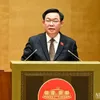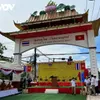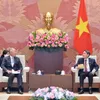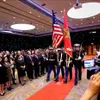PM meets with RoK President
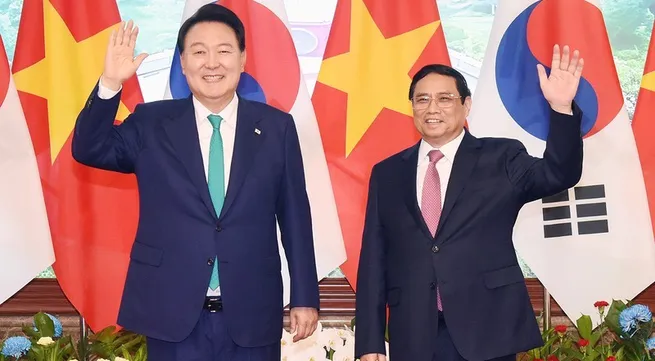
The PM told his guest Vietnam's consistent value and desire to further advance the new framework of the bilateral relations between the two countries with a broader and higher vision and goal.
In response, the RoK President congratulated Vietnam on its development achievements so far and highlighted that the RoK Government highly values the Vietnam-RoK relationship and considers Vietnam a key cooperative partner in the region.
Expressing their joy and satisfaction with substantive progress made in the bilateral relations, particularly its elevation to a comprehensive strategic partnership in December last year, the two sides exchanged views on specific measures to promote bilateral ties in politics, diplomacy, defence, security, economy, trade, investment, development cooperation, labour, science and technology, people-to-people exchange, among other areas.
Given slow global economic recovery, the two sides agreed to make joint efforts to enhance the effectiveness of the nations’ mutually beneficial cooperation and complement each other's strength, with a focus on making significant qualitative strides in economic ties.
PM Chinh proposed that both countries effectively implement the Vietnam-RoK Free Trade Agreement (VKFTA) and the Regional Comprehensive Economic Partnership (RCEP), thereby achieving the goal of raising their bilateral trade turnover to 100 billion USD in the near future and 150 billion USD by 2030 in a balanced and sustainable manner.
He also suggested that the RoK open its market further for Vietnam's key products such as agro-fishery goods and seasonal fruits; help Vietnamese enterprises join more deeply in the global supply chains of Korean businesses; and encourage Korean companies to expand their investment scale in Vietnam, particularly in priority areas such as infrastructure development, high-tech electronic manufacturing, semiconductors, renewable energy, and smart cities.
Chinh welcomed Korean businesses to invest in key national projects and BOT (Build-Operate-Transfer) projects involving the building of thermal power plants and liquefied natural gas (LNG) facilities in Vietnam.
He proposed the RoK transfer technology for Vietnam, create more favourable conditions for Vietnamese enterprises to invest in the RoK, and consider Vietnam a strategic destination for establishing Korean research and development (R&D) centres.
The PM underscored his commitment to addressing difficulties and obstacles facing Korean investors in Vietnam. He also suggested expanding exchanges between the Vietnamese and Korean youth and strengthening the bilateral people-to-people and locality-to-locality collaboration.

At the event (Photo: NDO)
Agreeing with PM Chinh, President Yoon stated that the RoK Government will continue to encourage and facilitate local enterprises to invest in Vietnam. He proposed increasing join works in the defence industry.
He hoped the Vietnamese Government will continue supporting and resolving difficulties for Korean investors, particularly concerning the sectors of finance-banking, infrastructure, and smart city building. Yoon also looked for Vietnam’s further assistance for RoK citizens as well as for the expansion of Korean educational institutions in Vietnam
The RoK will provide favourable conditions for Vietnamese students to study advanced technology and modern science and technology the country, he affirmed.
Given rapidly changing, complex, and unpredictable global and regional situations, both sides agree to make joint efforts to enhance the effectiveness of collaboration and mutually support each other regarding international and regional issues of mutual concern.
They said they will continue to cooperate closely within the ASEAN-RoK and Mekong-RoK cooperation frameworks, and coordinate for Vietnam to fulfill its role as the coordinating country for ASEAN-RoK relations for the 2021-2024 term.
They shared a common vision of ensuring security, safety, freedom of navigation, and aviation in the East Sea/South China Sea, maintaining a peaceful and stable environment and legal order, and resolving disputes at sea through peaceful means, ensuring the legitimate rights and interests of countries in accordance with international law, including the 1982 United Nations Convention on the Law of the Sea (UNCLOS).
The PM told his guest Vietnam's consistent value and desire to further advance the new framework of the bilateral relations between the two countries with a broader and higher vision and goal.
In response, the RoK President congratulated Vietnam on its development achievements so far and highlighted that the RoK Government highly values the Vietnam-RoK relationship and considers Vietnam a key cooperative partner in the region.
Expressing their joy and satisfaction with substantive progress made in the bilateral relations, particularly its elevation to a comprehensive strategic partnership in December last year, the two sides exchanged views on specific measures to promote bilateral ties in politics, diplomacy, defence, security, economy, trade, investment, development cooperation, labour, science and technology, people-to-people exchange, among other areas.
Given slow global economic recovery, the two sides agreed to make joint efforts to enhance the effectiveness of the nations’ mutually beneficial cooperation and complement each other's strength, with a focus on making significant qualitative strides in economic ties.
PM Chinh proposed that both countries effectively implement the Vietnam-RoK Free Trade Agreement (VKFTA) and the Regional Comprehensive Economic Partnership (RCEP), thereby achieving the goal of raising their bilateral trade turnover to 100 billion USD in the near future and 150 billion USD by 2030 in a balanced and sustainable manner.
He also suggested that the RoK open its market further for Vietnam's key products such as agro-fishery goods and seasonal fruits; help Vietnamese enterprises join more deeply in the global supply chains of Korean businesses; and encourage Korean companies to expand their investment scale in Vietnam, particularly in priority areas such as infrastructure development, high-tech electronic manufacturing, semiconductors, renewable energy, and smart cities.
Chinh welcomed Korean businesses to invest in key national projects and BOT (Build-Operate-Transfer) projects involving the building of thermal power plants and liquefied natural gas (LNG) facilities in Vietnam.
He proposed the RoK transfer technology for Vietnam, create more favourable conditions for Vietnamese enterprises to invest in the RoK, and consider Vietnam a strategic destination for establishing Korean research and development (R&D) centres.
The PM underscored his commitment to addressing difficulties and obstacles facing Korean investors in Vietnam. He also suggested expanding exchanges between the Vietnamese and Korean youth and strengthening the bilateral people-to-people and locality-to-locality collaboration.

Agreeing with PM Chinh, President Yoon stated that the RoK Government will continue to encourage and facilitate local enterprises to invest in Vietnam. He proposed increasing join works in the defence industry.
He hoped the Vietnamese Government will continue supporting and resolving difficulties for Korean investors, particularly concerning the sectors of finance-banking, infrastructure, and smart city building. Yoon also looked for Vietnam’s further assistance for RoK citizens as well as for the expansion of Korean educational institutions in Vietnam
The RoK will provide favourable conditions for Vietnamese students to study advanced technology and modern science and technology the country, he affirmed.
Given rapidly changing, complex, and unpredictable global and regional situations, both sides agree to make joint efforts to enhance the effectiveness of collaboration and mutually support each other regarding international and regional issues of mutual concern.
They said they will continue to cooperate closely within the ASEAN-RoK and Mekong-RoK cooperation frameworks, and coordinate for Vietnam to fulfill its role as the coordinating country for ASEAN-RoK relations for the 2021-2024 term.
They shared a common vision of ensuring security, safety, freedom of navigation, and aviation in the East Sea/South China Sea, maintaining a peaceful and stable environment and legal order, and resolving disputes at sea through peaceful means, ensuring the legitimate rights and interests of countries in accordance with international law, including the 1982 United Nations Convention on the Law of the Sea (UNCLOS).
